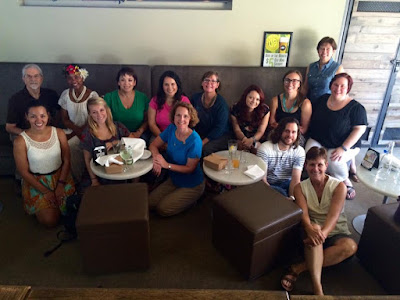 |
| Tuesdays with Morrie, Frankenstein, & The Wednesday Surprise |
The day began like any other,
a couple of shares from loved books.
And then an unexpected lesson
to help you be as smart as paint
and reread
or listen
to gain a new outlook.

Then we delved into something much deeper,
the stories from our hearts began to bloom,
it was then that we realized
our time at this institute
was much bigger
and we did
what we thought we couldn't do.

We grew brave with Lauren and "pulled the trigger".
We dreaded and longed to watch the Cubs game with Iris' dad.
We twinkled as teachers with Tiffaney,
crying happy tears, not sad.
We bore our battle scars with Theresa,
realizing they were only a smaller part of the bigger "us".
We tangled ourselves in prickly, thorny feelings with Erin
and learned that revising is a must!
We welcomed sleepy, flying dreams with Amy.
We flirted with the idea of leaving with Kris.
 We recalled the warmth of a loved one with Amanda
We recalled the warmth of a loved one with Amandaand promised to always recognize our bliss.
We grew strong as mothers with Madeline.
We were stung by the snickers thrown at our Sandra-strong hearts
and were reminded that the false construct of peace
could come up, like a rerun,
and tear us apart.
We were reminded to live mindfully
and always intentionally by Jan.
We were told by Alex
that the phonejack
was definitely
the best place to stick a crayon.
We danced down the isles with Katrina.
 We heard our inner child's voice with Michelle.
We heard our inner child's voice with Michelle.We thought about our pasts with Marianna
and remembered to live in the present as well.
And now
We reflect on the strategies we gained,
we appreciate the times we writers struggled,
we take all that remains
and try to add to the greater puzzle.
But what we wouldn't forget was our time here
to grow, to love, to know one another
becoming mightier in our passion,
and woven as internal teachers to each other.
We thank you for your time,
We thank you for your commitment,
and we will leave this time
forever
different.
Cheering loudly through our words.
Then we made our way to The Ogen
oh, so, re-luct-ant-ly,
not ready to disperse.
We shared some drinks and memories,
We talked like camping buddies,
And then we knew it was time to go,
to meet again after the school year begins,
which will be
oh, so, LOVELY.
Until then, my fabulous writing friends!
Keep writing, keep smiling,
and keep being funny! :)
-Amanda
After all, aren't we all? :)













